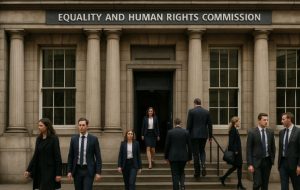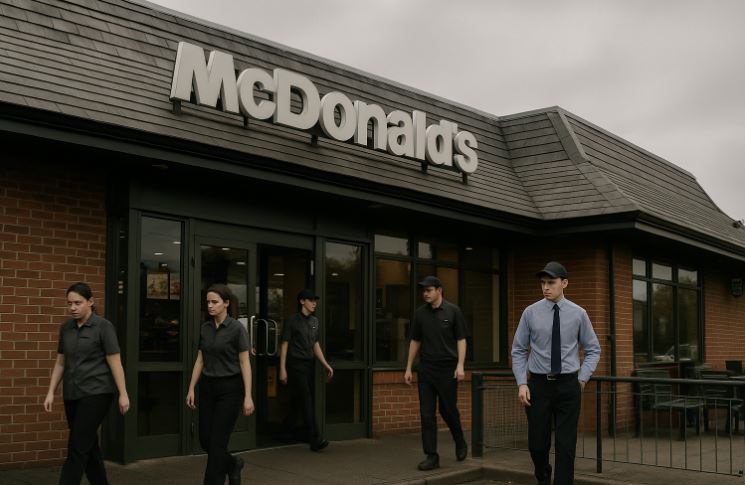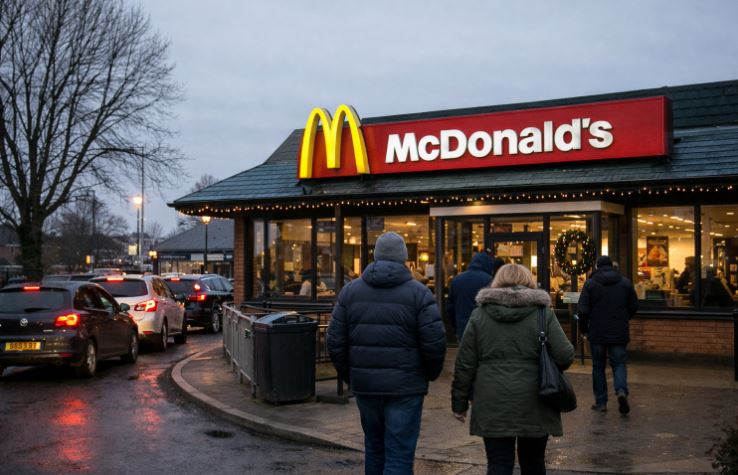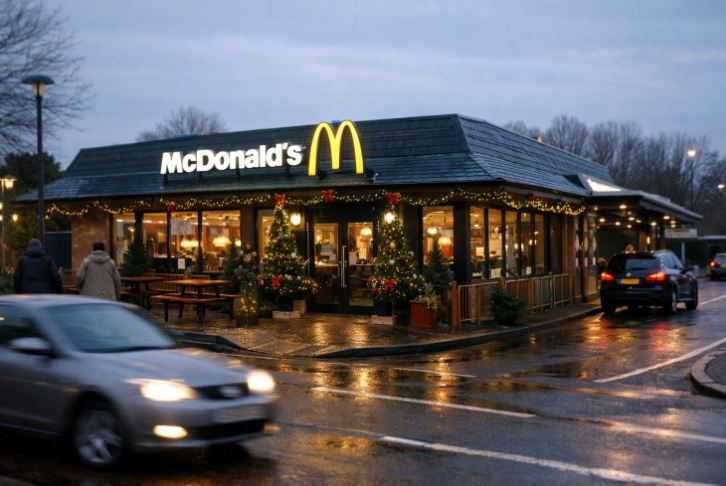Sexual harassment in the workplace has become an increasingly critical issue in the UK, especially in sectors with young and vulnerable employees. One of the most notable cases involves McDonald’s, a global fast-food giant with over 1,400 locations across the UK.
Allegations of misconduct, bullying, and harassment have put the company under scrutiny, prompting action from the Equality and Human Rights Commission (EHRC).
This blog explores the extent of the issue, the response from regulatory bodies, and the implications for employees working within the franchise-heavy McDonald’s business model.
What Triggered the Equality and Human Rights Commission’s Intervention?

The EHRC’s initial intervention came after a 2023 BBC investigation revealed alarming allegations from over 100 McDonald’s employees.
These included reports of sexual harassment, assault, racism, and bullying, with many cases involving workers as young as 16 or 17. Claims that harassment was happening “almost routinely” painted a picture of a toxic workplace culture in some branches.
In response, the EHRC signed a legal agreement under Section 23 of the Equality Act with McDonald’s UK to ensure the company would adopt new practices and avoid breaching equality laws.
However, the original agreement was later deemed insufficient when further incidents were reported, pushing the EHRC to strengthen its legal commitment with McDonald’s in early 2024.
How Prevalent Is Sexual Harassment at McDonald’s UK?
The problem appears far from isolated. Testimonies gathered during and after the BBC’s reporting indicate a systemic issue affecting various regions across England, Scotland, and Wales. Some of the most disturbing cases involved:
- A 17-year-old being groped by a colleague
- A 21-year-old who reported customer harassment and was told to “suck it up”
- A 20-year-old who received topless photos from a male manager
- A 16-year-old bullied and verbally abused by management
In total, more than 300 harassment-related incidents were reported to the EHRC, and over 160 individuals came forward following the initial investigation. This paints a troubling image, especially for a company employing around 148,000 people in the UK.
What Is the Section 23 Agreement and Why Is It Significant?
Section 23 of the Equality Act 2006 enables the EHRC to enter legally binding agreements with organisations to improve their practices and prevent further breaches of equality law.
This mechanism doesn’t require an admission of guilt but allows the EHRC to hold an organisation accountable for systemic issues related to discrimination or harassment.
In McDonald’s case, the updated agreement includes a comprehensive action plan, with EHRC oversight, to mitigate sexual harassment and protect staff, particularly in the franchise model, which accounts for 80–90% of UK McDonald’s outlets.
What Measures Has McDonald’s Committed to Implementing?

McDonald’s has responded by committing to a wide-ranging action plan, including the following steps:
| Key Measure | Description |
| Safeguarding Policy | A new safeguarding policy to protect vulnerable staff across all restaurants |
| External Safeguarding Experts | Collaboration with professionals to design a safer work environment |
| Independent Complaints Handling | External auditors to oversee and review harassment complaint procedures |
| Speak Up Channel | A 24/7 digital chatbot for staff to report misconduct anonymously |
| Training Refresh | Revised sexual harassment training, including modules on social media and grooming |
| External Investigations | Complaints about managers to be reviewed by individuals outside of the workplace |
| Regular Risk Assessments | Incorporating inspection learnings into routine workplace safety assessments |
| Franchise Commitment | All franchisees to pledge implementation of safeguarding and inclusive policies |
According to McDonald’s, 95% of employees are now aware of how to raise concerns through available internal channels.
Are Franchise Owners Being Held Accountable?
One of the challenges in enforcing standards at McDonald’s UK is its franchise-based model. While the EHRC agreement applies to corporate operations, it expects the franchisees to adopt the updated measures voluntarily. Given that the majority of McDonald’s outlets are not owned directly by the company, accountability becomes fragmented.
The EHRC has responded by writing to every McDonald’s branch in the UK, warning that legal action could be pursued if staff protection is not adequately enforced.
However, legal experts and unions argue that more direct regulation and accountability are required to avoid gaps in compliance.
Is McDonald’s Culture Changing or Is This Just PR?
There is scepticism among former staff and industry observers regarding McDonald’s ability, or willingness, to enact real change. A former employee interviewed by the BBC described the company’s actions as “a check box to tick,” implying that the initiatives are more about optics than impact.
Additionally, the law firm Leigh Day, representing over 100 workers, has initiated legal action against McDonald’s, with claims spanning over 450 restaurant locations.
These efforts indicate that many remain unconvinced by the company’s promises and feel a genuine shift in culture is still lacking.
How Does This Impact Young and Vulnerable Workers?
McDonald’s hires a large number of teenagers and young adults, often in their first jobs. This demographic is particularly vulnerable to grooming, coercion, and exploitation, especially in high-pressure environments with insufficient oversight.
The new EHRC agreement specifically addresses this concern by:
- Including social media and grooming in training modules
- Ensuring the external handling of complaints against managers
- Promoting anonymous reporting tools that young staff are more likely to use
- Implementing a communications strategy to raise awareness among workers about what behaviour is unacceptable and how to report it
This focus aims to make working at McDonald’s safer for younger employees who may not yet feel confident asserting their rights.
What’s the Role of Public Accountability and Media?

The BBC’s reporting has played a pivotal role in pushing McDonald’s and the EHRC into action. After the broadcaster published its findings in 2023, public pressure mounted.
MPs summoned McDonald’s UK executives to answer questions in Parliament, and the EHRC was compelled to extend and strengthen its legal oversight.
Without this sustained media attention, many of the safeguarding improvements may not have occurred, highlighting the importance of journalism in holding large corporations accountable.
What Can Other Employers Learn from McDonald’s Case?
McDonald’s situation is a stark reminder that corporate policies alone do not guarantee employee safety. For other fast-food and hospitality chains, key takeaways include:
- Ensuring training goes beyond compliance and promotes real cultural change
- Recognising the added responsibility when employing underage or vulnerable staff
- Establishing accessible, anonymous reporting systems
- Conducting external audits to ensure accountability
- Making sure franchisees follow the same ethical standards as corporate-owned locations
By learning from McDonald’s missteps, other employers can build safer and more inclusive workplaces.
Conclusion: Is McDonald’s Moving Towards a Safer Workplace?
The response to McDonald’s sexual harassment crisis has led to meaningful commitments, including the implementation of new training programmes, anonymous complaint systems, and external auditing processes.
While the EHRC has praised the company for taking significant steps, critics argue that real change will require more than policies, it demands a shift in culture and consistent enforcement across all outlets, especially in franchises.
Time will tell whether these measures will result in lasting improvements or if they remain performative. One thing is clear: the spotlight is firmly on McDonald’s, and both the public and regulatory bodies will be watching closely.
Frequently Asked Questions
What is the EHRC and how does it regulate companies like McDonald’s?
The Equality and Human Rights Commission is the UK’s national equality body. It can enter legal agreements with organisations and enforce compliance with equality laws, especially in cases involving discrimination or harassment.
What rights do fast food workers in the UK have against harassment?
Under the Equality Act 2010, workers have the right to a workplace free from sexual harassment, with legal protections in place regardless of age, gender, or job role.
Can McDonald’s franchisees be sued for employee harassment?
Yes. While franchises are individually owned, they are still responsible for maintaining a safe work environment. Legal claims can be filed against both the franchisee and McDonald’s UK, depending on the circumstances.
How does the Speak Up system at McDonald’s work?
It’s a digital 24/7 chatbot platform that allows employees to report harassment or misconduct anonymously. It’s designed to reflect communication preferences of younger workers.
Why are young workers at higher risk in fast food environments?
Younger workers may lack experience, feel intimidated by authority, or be unaware of their rights, making them more susceptible to harassment or exploitation.
What role do external audits play in harassment cases?
External audits provide independent oversight to ensure complaints are handled fairly and policies are implemented properly, which builds trust in the reporting system.
How can other restaurant chains avoid similar scandals?
By implementing transparent policies, conducting external training, promoting anonymous complaint systems, and holding franchisees to high standards of conduct.




